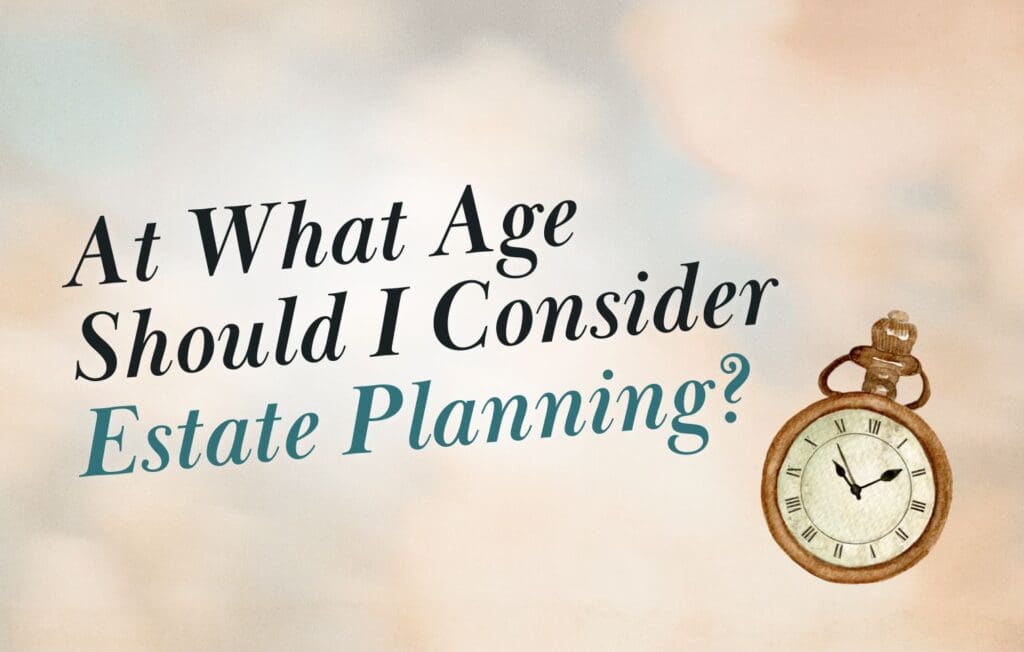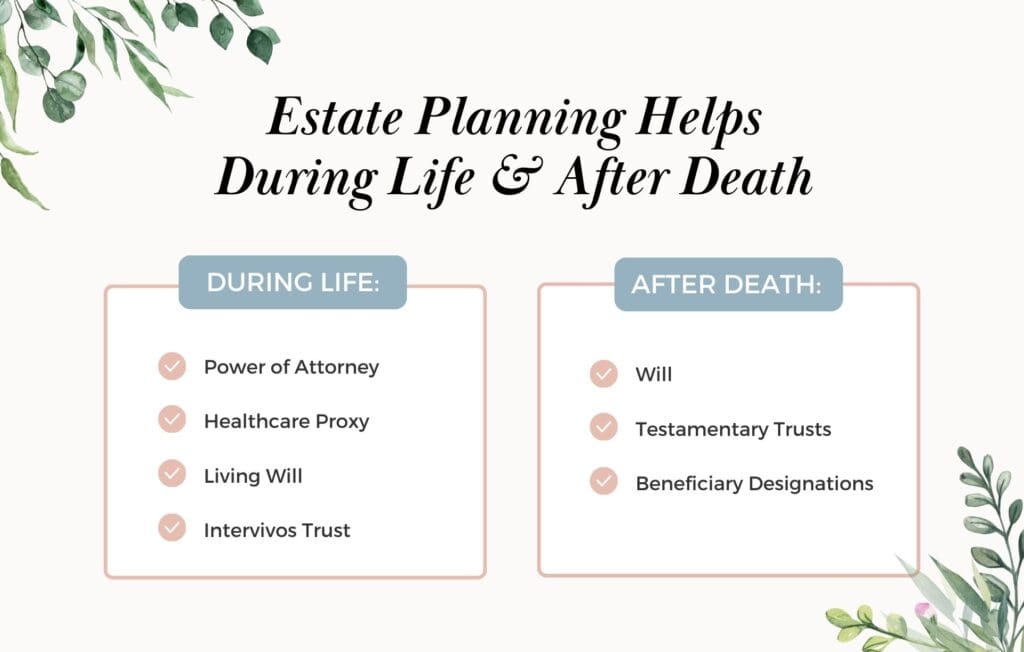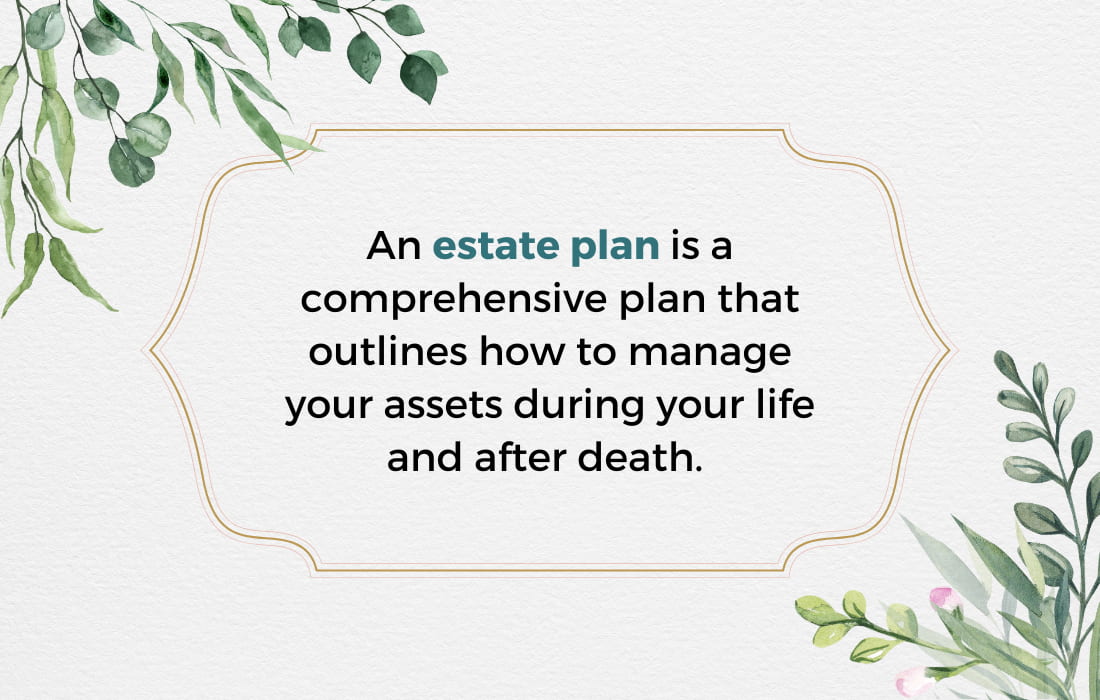Estate Planning Isn’t Just for the Super Wealthy
Written By Tiffany Woodfield, Financial Coach, TEP®, CRPC®, CIM®
Q: “At what age should I consider estate planning?“
Many people falsely assume they only need to start estate planning once they are “old or wealthy.”
In fact, you should consider establishing an estate plan when you become a legal adult because once you are a legal adult, your family doesn’t automatically have the authorization to make decisions for you.

Imagine if something happened to you, even temporarily.
If you don’t have the proper documents, the laws and courts determine what happens to you and who is authorized to make decisions on your behalf.
In other words, you should do estate planning as soon as you’re an adult. For more on how to get started, keep reading!
What does estate planning involve?
Estate planning involves arranging for the management and distribution of your estate during your life and after death.
During Life:
- Power of Attorney – to appoint someone to make financial decisions for you if you are incapacitated.
- Healthcare Proxy – allows someone to make medical decisions when you cannot. (+)
- Living Will – outlines your preferences for end-of-life care and medical treatment.
- Intervivos Trust – set up during your lifetime with instructions to the trustee on managing your assets.
After Death:
- Will – outlines how your assets will be distributed, names guardians for minors and names of beneficiaries.
- Testamentary Trusts – details how to distribute and manage your assets after your death.
- Beneficiary Designations – directs how insurance policies and financial accounts will be distributed upon your death.

How is estate planning different from creating a will?
A will is only one component of an estate plan. The will is designed specifically to focus on how to distribute your assets upon death. In contrast, an estate plan is a comprehensive plan that outlines how to manage your assets during your life and after death.
It includes incapacity planning, tax and financial planning and other documents including a will.
Should I start estate planning in my 20s or 30s?
Creating an estate plan in your 20s or 30s may not seem urgent, but it becomes essential when considering your online profiles, bank accounts, and dependents.
It’s usually affordable and ensures your wishes are respected, especially if unforeseen circumstances arise. Key documents like a power of attorney and a healthcare proxy appoint trusted individuals to make decisions for you if you’re unable to do so.
So, yes, you should start estate planning as soon as you’re an adult.
What life events indicate the need for estate planning?
Several life events can indicate the need for estate planning.
Some of the key milestones and changes that should prompt you to create or update your estate plan are as follows:
- Marriage
- Children
- Divorce or Separation
- Purchasing a Home
- Health Changes
- Starting a Business
- Retirement
- Death of a Loved One
- Relocation to another country, state or province
Should I wait until retirement to create an estate plan?
If you wait until retirement to create an estate plan, you are putting yourself at risk if something happens to you beforehand.
It can also lead to lost opportunities to set up trusts or other financial tools to protect assets and benefit your heirs. Finally, this lack of planning can lead to higher costs and tax liabilities.
What are the risks of delaying estate planning?
The risks of delaying estate planning include:
- Dying Intestate: Passing away without a will exposes your assets to government distribution laws.
- Minor Children Not Protected: Without a legal document designating a guardian, your minor children may not be cared for by someone you trust.
- No Plan for Incapacity: Failing to plan means you lose control over who makes decisions about your medical care and finances if you become incapacitated.
- Prolonged Asset Distribution: A lack of clear planning can lead to delays in distributing your assets, increasing stress and potential conflict among family members during an already difficult time.
Can estate planning benefit me even if I’m young and healthy?
Absolutely! I had a friend who was “young and healthy” and experienced a shocking medical emergency that came out of nowhere.
She was peeling potatoes for dinner at home when her husband, a firefighter, came in. Only half of her face was moving when he started speaking to her, and she hadn’t even noticed.
Luckily, from his training, he knew he needed to get her to the hospital immediately. She thought she was fine and felt maybe a little numb. It turns out that she had had a stroke, and rushing to get medical attention saved her from having any lasting damage from that stroke.
When she called to tell me, I remember being confused. I said, “Your dad had a stroke?”
“No, she replied, “I did.”
My friend never got a cold, always had energy, and was super healthy. After this happened, she realized they didn’t have a proper estate plan in place to cover what would happen if she were incapacitated. They didn’t worry or think about it because they were “young and healthy.”
Remember, life happens and doesn’t wait until we have all our “ducks in a row.”
Is estate planning necessary if I don’t have significant assets?
Yes, because estate planning ensures your wishes regarding distributing personal belongings and digital assets, such as social media accounts, are respected.
It designates trusted individuals to make financial and medical decisions on your behalf in case of incapacity. Additionally, a plan can prevent confusion and conflict among family members during difficult times.
How often should I update my estate plan?
The general rule of thumb is to update your estate plan every 3-5 years or sooner if you have a significant life event such as marriage, divorce, relocation, kids or health changes.

Final Thoughts
Estate planning is not just a task for retirees or the ultra-wealthy—it’s an essential step for anyone who wants to control their financial, medical, and personal decisions.
Starting early allows you to adapt your plan as your life changes and ensures your wishes are respected no matter what happens. Life’s unpredictability makes estate planning a gift not only to yourself but also to your loved ones. It can reduce stress and potential conflict during challenging times. In sum, a thoughtful estate plan is a cornerstone of comprehensive financial and life planning.
Summary of Key Points
- Start Estate Planning Early: Begin estate planning as a legal adult to ensure your family can make decisions on your behalf if needed.
- Estate Planning vs. Will: A will handles asset distribution after death, while an estate plan covers life and post-death management comprehensively.
- Key Life Events: Milestones like marriage, children, or health changes signal the need to create or update your estate plan.
- Risks of Delay: Delaying estate planning can lead to government intervention, unprotected minors, and unresolved medical or financial decisions.
- Beneficial for All Ages: Even the young and healthy should plan to safeguard their wishes for medical, financial, and digital asset management.
Get the Free Guide and Audio Meditation for Manifesting Your Dreams
Pop your email address in the form below to get my easy checklist and guide to manifesting and the guided audio meditation to help you get started.
You’ll also get one or two emails per month with the latest blog posts about abundance, wealth-building, manifesting, and creating a fulfilling life.
Related Articles
💎 What Is Estate Planning in Canada?
💎 What to Bring to an Estate Planning Appointment
💎 How to Establish Generational Wealth
About the Author

TIFFANY WOODFIELD is a financial coach, cross-border expert, and the co-founder of SWAN Wealth based out of Kelowna, BC. As a TEP and associate portfolio manager, Tiffany has extensive experience working with successful professionals who want to leave a legacy and enjoy an adventurous, work-optional lifestyle. Tiffany combines extensive knowledge from her background as a financial professional with coaching and her passion for personal development to help her clients create a unique path that allows them to live their fullest potential. Tiffany has been a regular contributor to Bloomberg TV and has been interviewed by national and international publications, including the Globe and Mail and Barron’s.